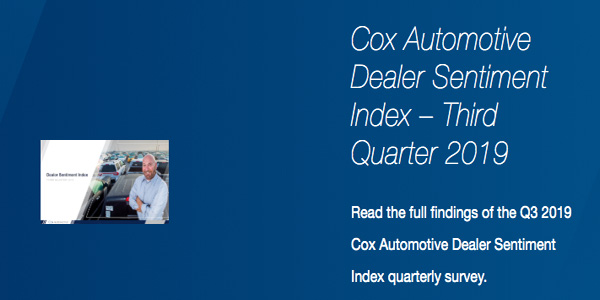According to the Q3 2019 Cox Automotive Dealer Sentiment Index (CADSI) released recently, U.S. automobile dealers view the current market as negative, with an index score of 48. The slight decrease from Q2’s score of 49 was not statistically significant. The index reading of 48 indicates that slightly more dealers feel that the current market is weak compared to the number who feel the current market is strong.
In many measures, however, the assessment of the U.S. auto market depends on what type of automobile dealer you ask. Franchised auto dealers, operations that sell both new and used vehicles, have a mostly positive view of the market. Independent dealers, those who focus only on used-vehicle sales, offer a different perspective.
Franchised dealers, for example, feel the current market is strong, with an index score of 56, a two-point increase from Q2. Independent dealers, on the other hand, feel the current market is weak, with an index score in Q3 of 46, a two-point decrease from Q2.
Expectations for the next quarter differ between the two groups as well. Franchised dealers continue to believe the market will remain strong, with an index score of 57. Independent dealers, conversely, expect the market to be weak in the next quarter. Their expectations score fell below 50 for only the second time since the CADSI began in Q2 2017.
For both dealer groups, expectations for the future market are down from Q2 but still positive. The overall index score fell to 51 in Q3, below last year and last quarter. The decline in expectations was statistically significant from last quarter’s score of 55.
“Dealers are becoming less optimistic as they consider the future,” said Cox Automotive Chief Economist Jonathan Smoke. “We also continue to see a big difference in outlook by type of dealer, as sentiment consistently skews more positive for franchises compared to independents.”
For franchised dealers, the current new-vehicle sales index was also down compared to last year, but stable compared to last quarter. The new-vehicle sales index remains above 50 indicating a good market. Franchises also continue to see the used-vehicle sales as stronger than new. They report both new- and used-vehicle inventory continues to grow.
For independents, the used-vehicles sale index in Q3 was negative at 49, a score slightly lower than last quarter and Q3 2018. Factors influencing a pessimistic view of the current market are the perception of a weakening economy, consumers being less interested or more cautious about purchasing vehicles, and a lack of used-vehicle inventory. Independent dealers report that used-vehicle inventories are declining.
Factors Holding Back Business
When asked about factors holding back the business, dealers in aggregate reported no change from Q2 to Q3. Market Conditions remained in the top spot as the most cited negative factor for both groups. Competition held in second place. Limited Inventory remained No. 3, followed by Credit Availability for Consumers and Expenses.
Factors holding back the business is another area where franchised and independent dealers diverge, with Limited Inventory and Credit Availability For Consumers more of a concern for independent dealers. Staff Turnover is among the top-5 factors holding back business for franchised dealers. For independents, Staff Turnover is hardly a concern. Only 5% of independent dealers named it as a factor holding back business in Q3, compared to 22% of franchised dealers.
Costs, Tariffs and the Economy
If there is one area franchised and independent dealers align, it is in their opinions of costs, which continue to rise. Costs, however, are not the top worry for franchised dealers. Rather, the threat of tariffs on imported vehicles and parts impacting their profitability is their most negative concern. Overall, only 8% of automobile dealers in the U.S. believe tariffs will have a positive impact on business profitability. Conversely, nearly 6-in-10 franchised dealers believe the impact will be negative. Independent dealers are more likely to see tariffs as having no impact on their business.
For the first time, dealers participating in the quarterly CADSI survey were asked about the state of the U.S. economy. On this front, there was perfect alignment between franchised and independent dealers. Both groups had an index score of 55, meaning more dealers feel the current U.S. economy is strong compared to the number who feel the current economy is weak.
Links:
Cox Automotive


